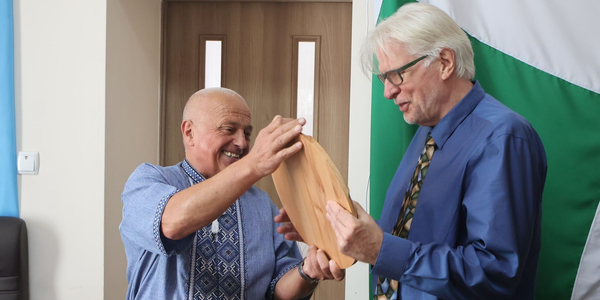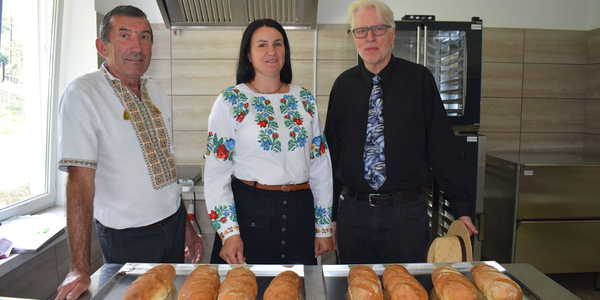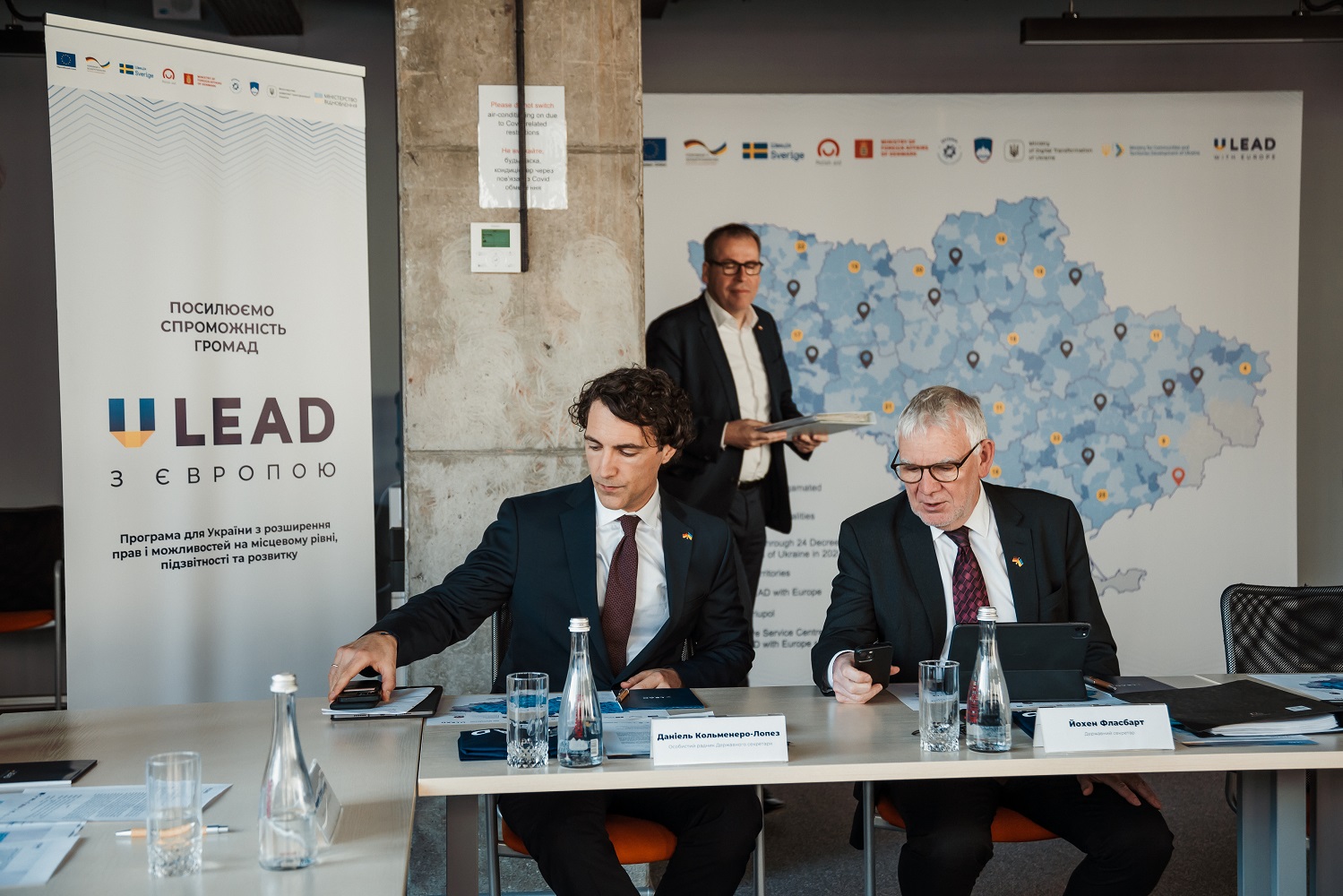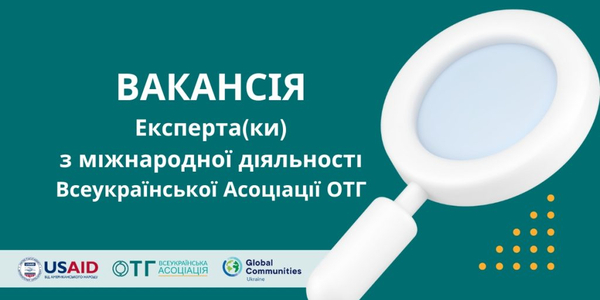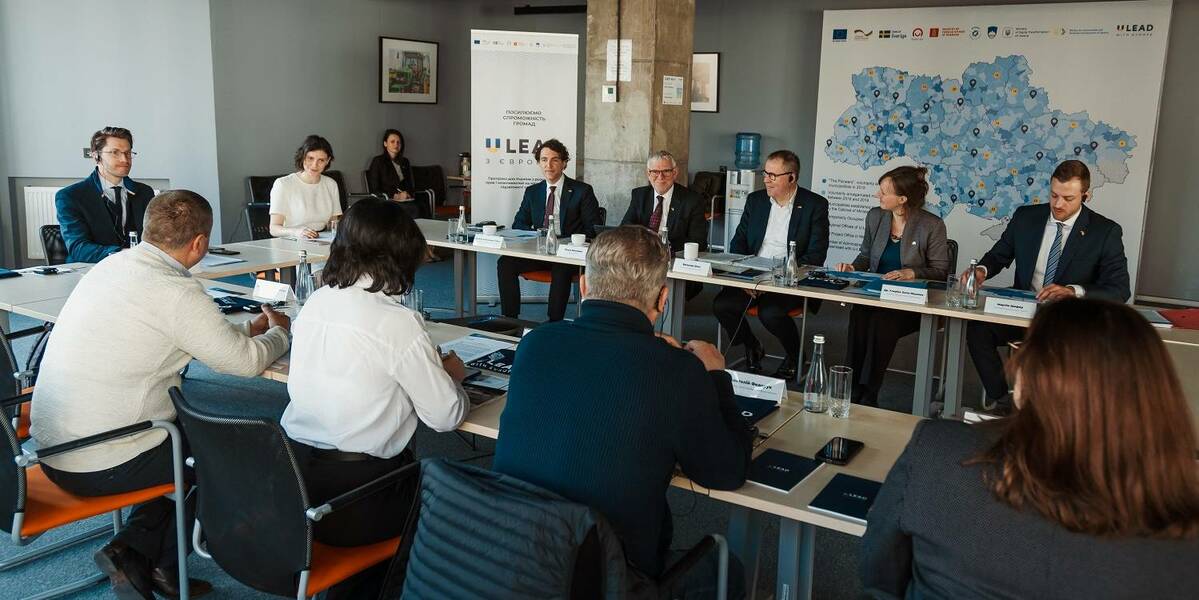
Representatives of the German Ministry, the German Embassy and mayors from three different oblasts met at the office of U-LEAD and discussed the wartime challenges and the principles of future reconstruction.
On April 20, at the House of Decentralisation, a Roundtable Discussion “The Role of Hromadas in Rebuilding Ukraine” was held with the participation of high representatives of the Federal Ministry for Economic Cooperation and Development, German Embassy, mayors of Ukrainian municipalities and U-LEAD team.
The Roundtable focused on wartime challenges faced by Ukrainian municipalities. In particular, the participants discussed the importance of rebuilding damaged infrastructure and the prompt response of municipalities to urgent needs in terms of providing basic municipal services, housing and caring for internally displaced persons (IDPs), as well as restoring the local economy.
Helge Arends, representing U-LEAD’s Directorate, greeted the honourable guests and reaffirmed U-LEAD’s commitment to the development of Ukrainian municipalities, as it is crucial for rebuilding Ukraine.
“This way we want to contribute to putting Ukraine back on the path to prosperity within the European family — winning the peace, as well as the war. This is also why these efforts are guided by principles we try to promote to ensure that the local level plays a key role in the reconstruction process.”
As was emphasised by Jochen Flasbarth, State Secretary, Federal Ministry for Economic Cooperation and Development (BMZ), Germany has been a firm supporter of Ukraine, especially during these difficult times of war.
“Core element of our cooperation has been decentralisation. It’s a miracle how tough Ukrainian society and local leaders appeared to be in their resilience against the Russian aggressor. At least decentralisation gave additional strength to local municipalities, therefore, we want to continue this help through U-LEAD with Europe to make municipalities even stronger in their recovery efforts,” said Mr Flasbarth.
According to Yuliia Posternak, Mayor of Kulykivka municipality, Chernihiv oblast, decentralisation was the best thing that could happen to Ukraine.
“It is during the greatest trials for the country, during the war, that horizontal ties between municipalities, established by the reform, worked out, helping to fight the enemy together. We are a municipality with a population of 15,000 that survived the terrifying first months of a full-scale war. 4 settlements in the municipality suffered 60% damages, with more than 100 houses completely destroyed by Russian missiles. 8 enterprises were affected. Our municipality has already overcome many challenges, in part thanks to international partners. U-LEAD and GIZ were the first to lend us a helping hand as we were recovering from the destruction. In cooperation, we are ready to continue to cope with challenges, rebuild better and return people to municipalities.”
According to Anatolii Fedoruk, Mayor of the Bucha urban municipality, reconstruction requires a comprehensive approach, which will include a detailed analysis of the municipality’s ability to maintain the restored infrastructure. This is the only way to ensure that the reconstruction is the most effective and aimed at the further development of the municipality.
“We are grateful for the help of the governments of all countries, including Germany, but international communication at the level of the municipalities themselves is also vital. We already need to provide traffic, residential and utility infrastructure and have access to the necessary special utility equipment — and the help from German municipalities will be extremely valuable in this.”
Later, during his presentation on the empowerment of municipalities in Ukraine, Helge Arends talked about the Five Mechanisms of Rebuilding Ukraine according to the bottom-up principle:
- No decisions on local self-government bodies without their active participation. Municipalities should be represented in the national governance structure and decision-making process, and not only as observers or stakeholders.
- Centralised approach should be used where necessary, while the local approach should be the default. Reconstruction must comply with the principles of multi-level management and subsidiarity. Municipalities must be properly consulted.
- Only grants, no loans. Most municipalities do not have access to credit agreements from international financial institutions. These municipalities can and should receive support only through grants.
- A fair, transparent and inclusive financing mechanism. The creation of a special financing package that provides municipalities with exclusive and direct access to international funds through grants will be critical to secure the benefits of the decentralisation reform.
- Elimination of legal ambiguity. The unfinished reform programme must be completed in accordance with the European Charter of Local Self-Government signed by Ukraine.
Pavlo Kuzmenko, Mayor of the Okhtyrka municipality, Sumy oblast, added that while working with U-LEAD, they had got a handle on a systematic approach to development where, rather than funding, the determining factor was previous successful project work that clearly defined growth points, had accurate cost calculations, clear deadlines and vision of the final result.
We continue moving forward together, working for the empowerment of Ukrainian municipalities and making Ukraine stronger!

